The 2015 Guidelines have not changed any of the elements taught previously. To that end I am including this from a previous article with some minor changes so everyone has the most up to date information available.
Have you ever seen someone choking? Have you ever had something go down the wrong pipe? It is almost the same thing, but not quite. I have been an Emergency Responder for more than 20 years and have seen several people choking. It is not a pretty thing to see. The person’s eyes are practically popping out of their head. Their hands are not clutching their neck they are trying to tear their throat open. They turn cyanotic (bluish-purple) and gag. They keep on trying to cough but nothing comes out. There is a wild look in their eyes and then they almost drop right then and there. Ask them “Are you choking?” if they can’t answer or barely can breathe, tell them It’s OK you are going to help them. Next, you should stand behind them while they are standing. If they do not appear to be obese and you can get your arms around their waist, stand behind them and tell them “I am going to help you”. Next, place yourself behind them with your body turned to the side with your stronger leg extended behind you. Distribute your weight evenlybetween the back leg (stronger) and your outstretched front leg. Push your chest out and have the patient lean against your chest and position themwith one leg on either side of your outstretched front leg. They should almost be able to sit on your front knee. If the person is taller have them shift further toward your knee and if they are shorter try to get them higher on the outstretched front leg. The object is to have your arms extend straight around their waist so you can bring them straight back and up. See figures:
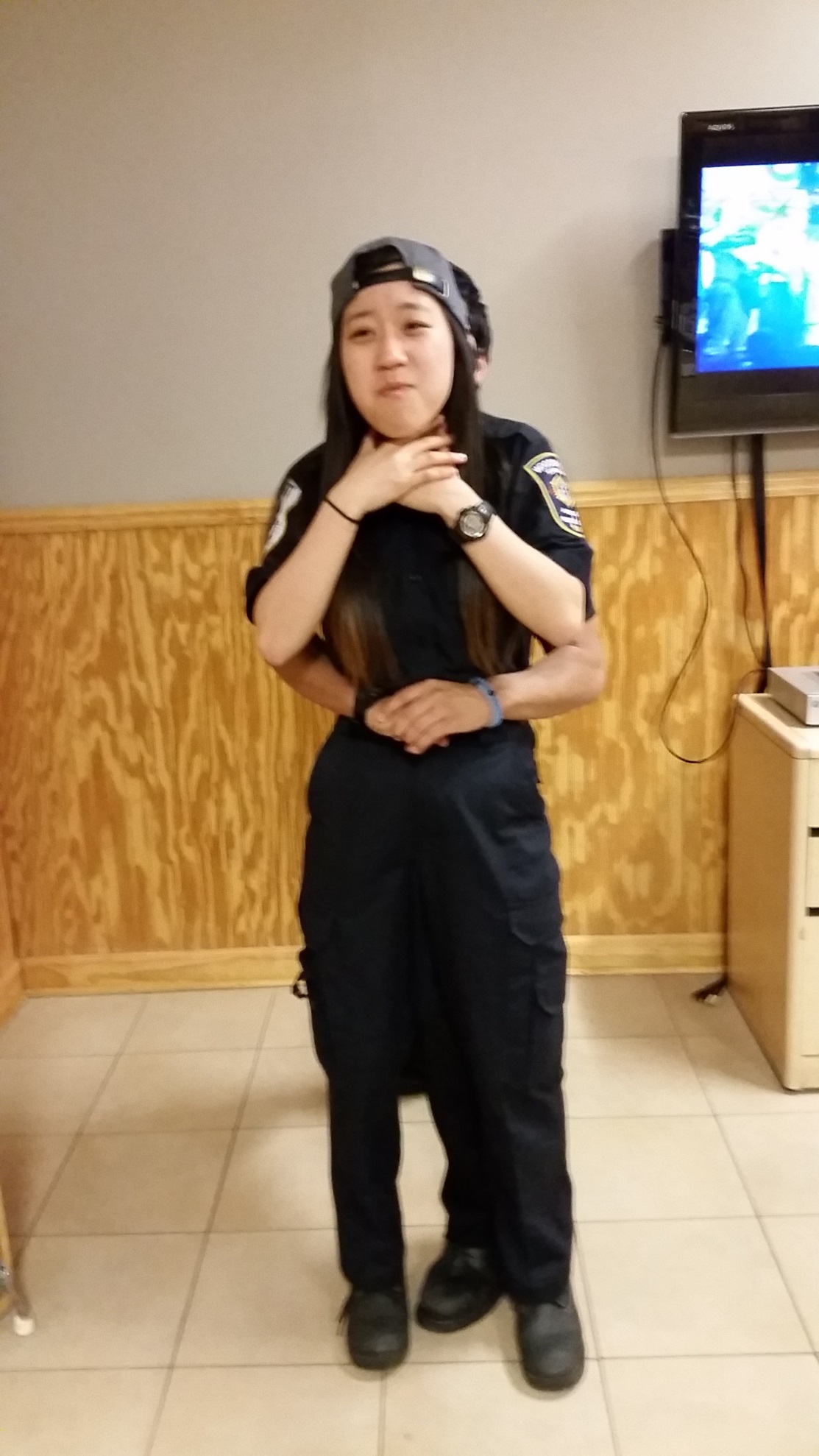
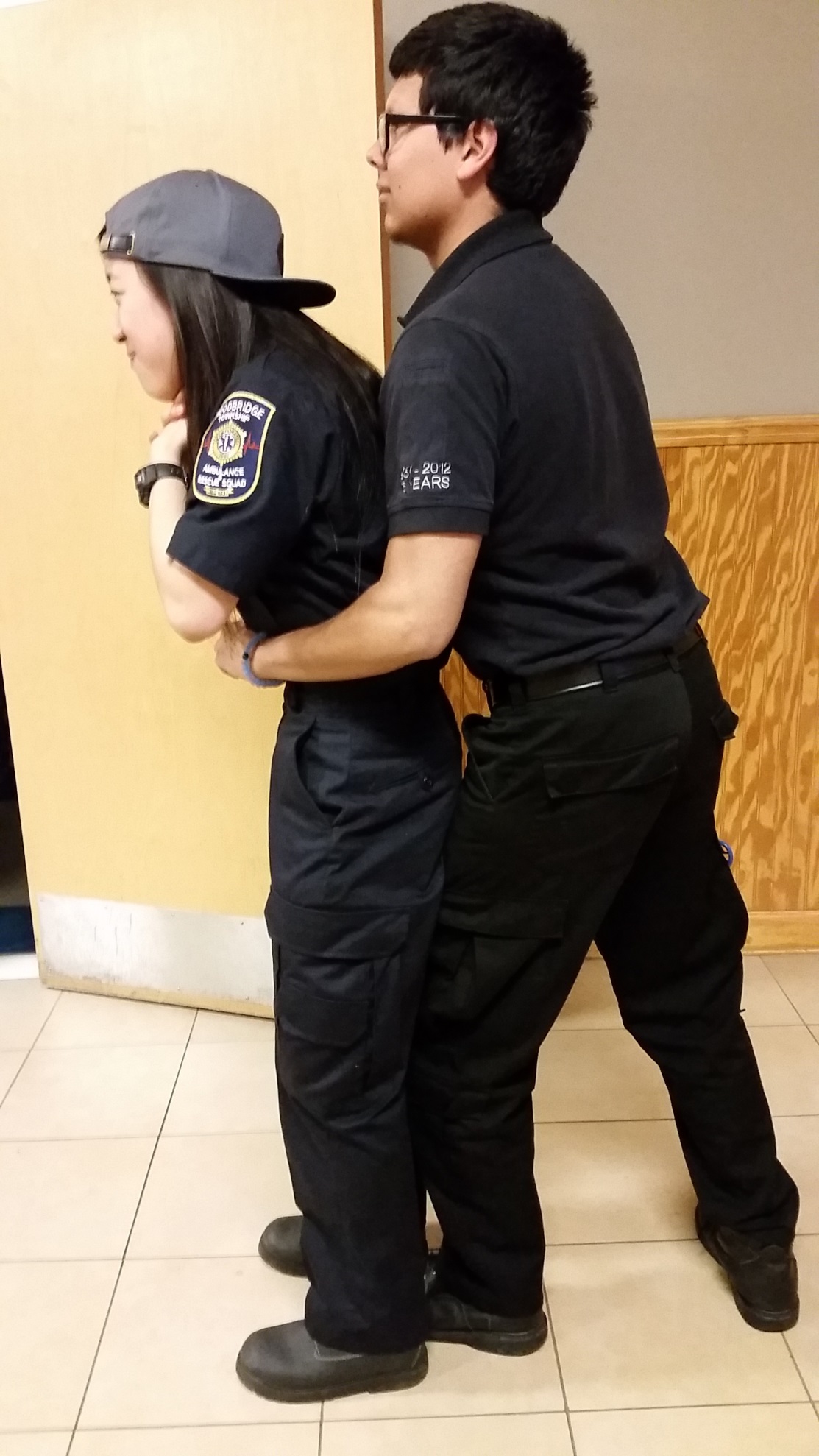
To find the navel place your hand on the top of the hip bone and bring it around to the front of the victim’s body. There you will find the navel. Place the thumb on one hand ABOVE  the navel under the rib cage and cover that hand with the other. Thrust your hands in and up to effect the thrust in a swift inward motion. Keep on thrusting until the foreign body is removed or the victim collapses.  If the victim is pregnant or has a waist you can’t get your arms around, slide your arms under her armpits and bring your hands to the center of her chest. Pull straight back. See figures:
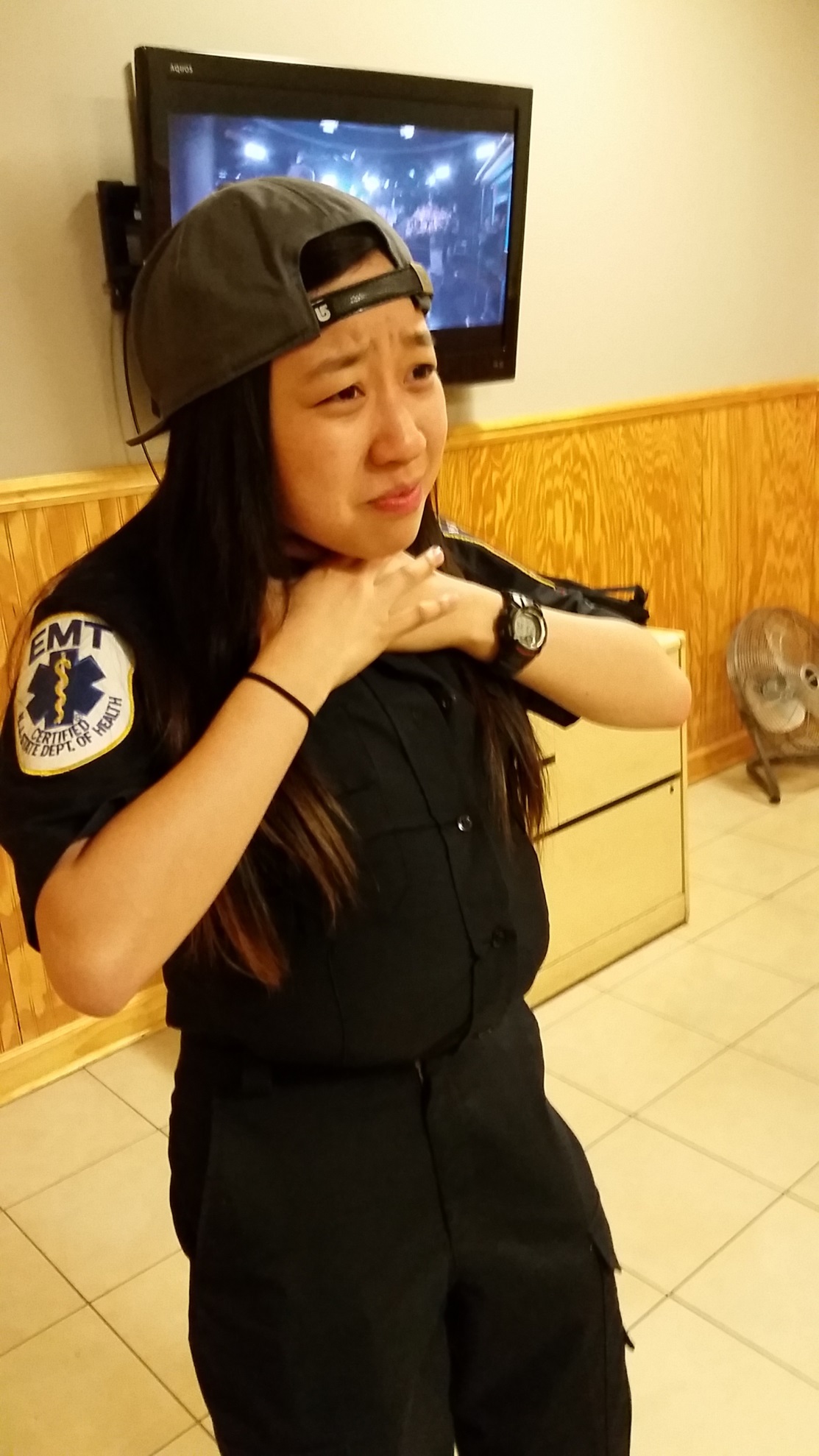
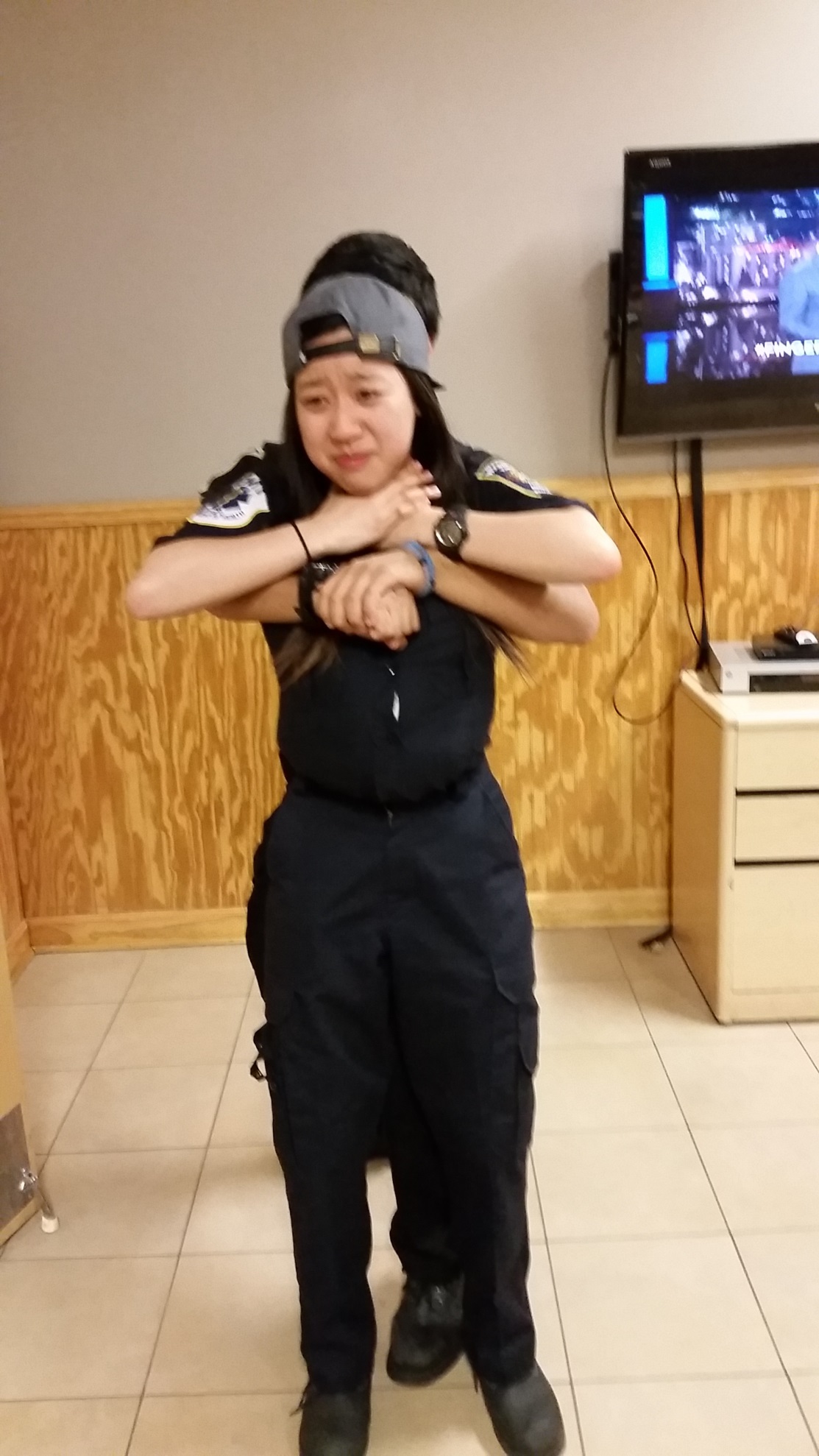

If they collapse let them slide down your leg and support their head till you lay them down and then call 911. Because you are posting forward they will not fall back on you so you don’t have to worry about them falling back and possibly taking you down with them. You are safe and so are they. Remember if they are pregnant to put your arms under their armpits to support the body and the baby chamber. Now if the victim is very large or extremely heavysit them in a chair,preferably with four legs. If all you have is a chair with wheels have someone stand behind to anchor it or place the back against the wall with one foot on the front wheel assembly. If you don’t have a chair, sitthem against the wall or put them in the wheel well of a vehicle if you are in a parking lot. Hold the back of the chair or tire. Place the heel of your strong hand against their chest and push straight in. If they become unresponsive you can tilt the chair forward and slide them to the floor holding their head and call 911. Again, you are safe and so are they. If alone, put your cell phone on speaker and dial 911 while beginning compressions. See figure:
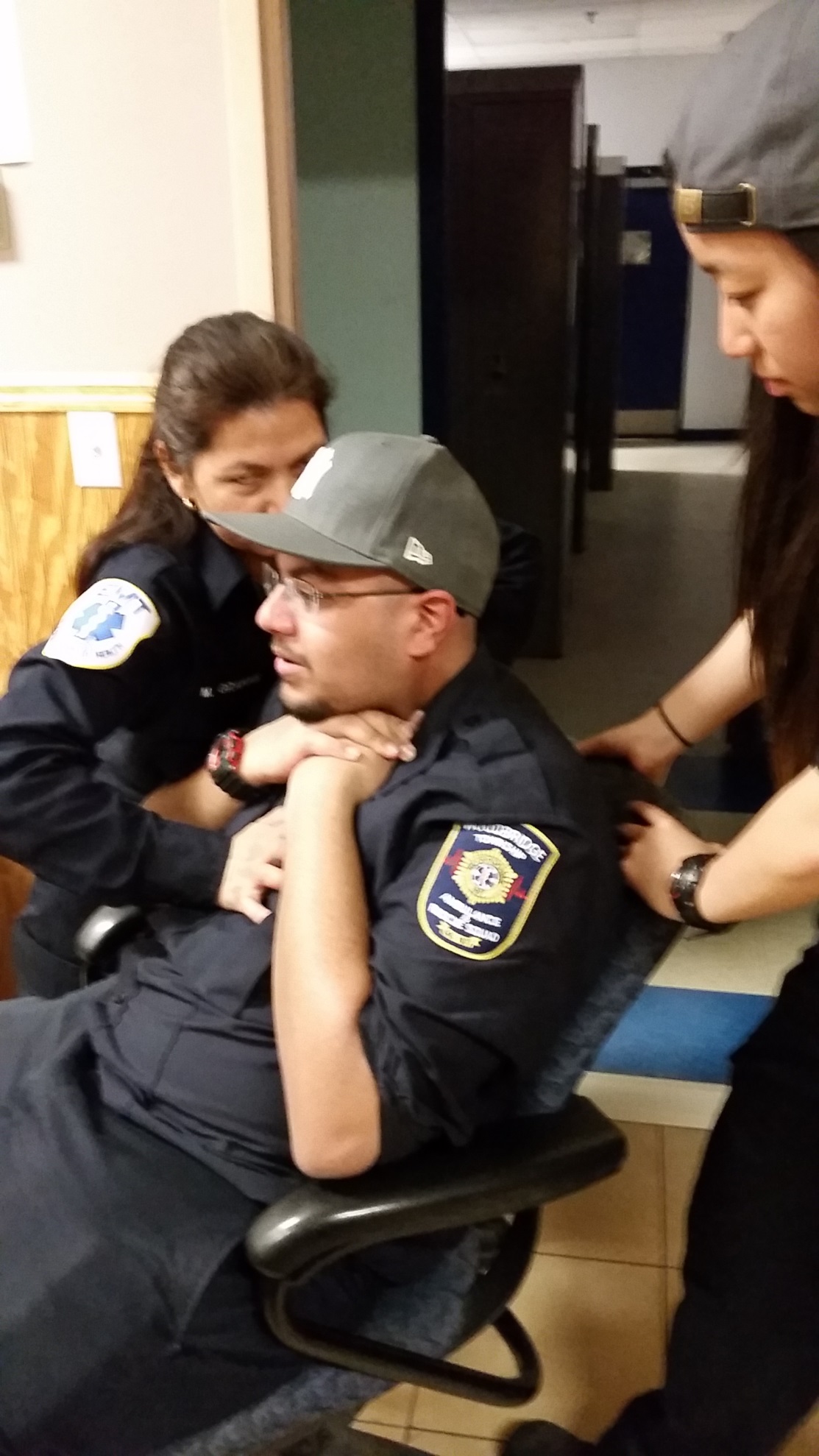
Lastly, if the victim is in a wheelchair, remember to LOCK THE WHEELS and follow the instructions above. If they are not obese just pop the side bars off the wheel chair and reach your arms around. You will probably do better kneeling behind the chair. If they are obese hold onto the back of the chair and follow the instructions above. However, if they go unconscious you will have to be careful lowering them to the floor. I recommend getting the foot rests out of the way when you first start helping them. This way if an adult becomes unresponsive the foot rests won’t impede your efforts of getting them safely to the floor. Once the victim is lowered safely to the ground, you should call 911 and begin CPR. If alone,put your cell phone on speaker and call 911 while beginning compressions. When the dispatcher comes on line tell them what you are doing and don’t hang up. If it is a child you will probably have to kneel down behind them so your arms comes through at their waist line. Maintain gentle pressure on the abdomen and thrust inward to dislodge the foreign body. If the child becomes unresponsive lower them to the ground and have a person (you) call 911. If alone perform 2 minutes of CPR,then call 911. Remember, it is important to call 911, but you can’t leave the victim alone for too long. If you are alone use your cell phone. Continue compressions and breaths (if you have a barrier device or if it is a family member you can use mouth to mouth). Each time you attempt a breathlook inside the mouth and if you see something there hook your finger and follow the cheek to the back of the throat. Hook what’s there and pull it out. Continue CPR until all the foreign material is removed or the airway becomes clear enough to get effective (chest rise) breaths, or a person with a higher medical authority arrives to help. Remember, if you perform abdominal thrusts on anyone they have to be seen by a healthcare provider immediately following the incident. In the next chapter we will cover the Infant Choking sequence.

John has been an AHA Instructor Trainer since 1993, and is involved at all levels of CPR science development and the introduction of various CPR enhancement techniques and equipment. Since retiring from the Port Authority in 2000, he has been actively spreading the news of increased effectiveness of improved CPR teaching and training by attending National and Local EMS conferences and presenting at the annual ECCU conference. In addition, he spends a good deal of time teaching AHA CPR and First Aid to doctors, nurses, PCT''s, EMTs, and security personnel in hospitals, doctors and dentists offices, Professional Trainers, gyms, shopping malls and pharmacies in New York and New Jersey. He also volunteers as EMT- BLS IT with the Woodbridge Township Ambulance & Rescue Squad as Chief of Operations and Training Director.
More articles by the writer
The 2015 Guidelines have not changed any of the elements taught previously. To that end I am including this from a previous article with some minor changes so everyone has the most up to date information available.
Have you ever seen someone choking? Have you ever had something go down the wrong pipe? It is almost the same thing, but not quite. I have been an Emergency Responder for more than 20 years and have seen several people choking. It is not a pretty thing to see. The person’s eyes are practically popping out of their head. Their hands are not clutching their neck they are trying to tear their throat open. They turn cyanotic (bluish-purple) and gag. They keep on trying to cough but nothing comes out. There is a wild look in their eyes and then they almost drop right then and there. Ask them “Are you choking?” if they can’t answer or barely can breathe, tell them It’s OK you are going to help them. Next, you should stand behind them while they are standing. If they do not appear to be obese and you can get your arms around their waist, stand behind them and tell them “I am going to help you”. Next, place yourself behind them with your body turned to the side with your stronger leg extended behind you. Distribute your weight evenlybetween the back leg (stronger) and your outstretched front leg. Push your chest out and have the patient lean against your chest and position themwith one leg on either side of your outstretched front leg. They should almost be able to sit on your front knee. If the person is taller have them shift further toward your knee and if they are shorter try to get them higher on the outstretched front leg. The object is to have your arms extend straight around their waist so you can bring them straight back and up. See figures:


To find the navel place your hand on the top of the hip bone and bring it around to the front of the victim’s body. There you will find the navel. Place the thumb on one hand ABOVE  the navel under the rib cage and cover that hand with the other. Thrust your hands in and up to effect the thrust in a swift inward motion. Keep on thrusting until the foreign body is removed or the victim collapses.  If the victim is pregnant or has a waist you can’t get your arms around, slide your arms under her armpits and bring your hands to the center of her chest. Pull straight back. See figures:



If they collapse let them slide down your leg and support their head till you lay them down and then call 911. Because you are posting forward they will not fall back on you so you don’t have to worry about them falling back and possibly taking you down with them. You are safe and so are they. Remember if they are pregnant to put your arms under their armpits to support the body and the baby chamber. Now if the victim is very large or extremely heavysit them in a chair,preferably with four legs. If all you have is a chair with wheels have someone stand behind to anchor it or place the back against the wall with one foot on the front wheel assembly. If you don’t have a chair, sitthem against the wall or put them in the wheel well of a vehicle if you are in a parking lot. Hold the back of the chair or tire. Place the heel of your strong hand against their chest and push straight in. If they become unresponsive you can tilt the chair forward and slide them to the floor holding their head and call 911. Again, you are safe and so are they. If alone, put your cell phone on speaker and dial 911 while beginning compressions. See figure:

Lastly, if the victim is in a wheelchair, remember to LOCK THE WHEELS and follow the instructions above. If they are not obese just pop the side bars off the wheel chair and reach your arms around. You will probably do better kneeling behind the chair. If they are obese hold onto the back of the chair and follow the instructions above. However, if they go unconscious you will have to be careful lowering them to the floor. I recommend getting the foot rests out of the way when you first start helping them. This way if an adult becomes unresponsive the foot rests won’t impede your efforts of getting them safely to the floor. Once the victim is lowered safely to the ground, you should call 911 and begin CPR. If alone,put your cell phone on speaker and call 911 while beginning compressions. When the dispatcher comes on line tell them what you are doing and don’t hang up. If it is a child you will probably have to kneel down behind them so your arms comes through at their waist line. Maintain gentle pressure on the abdomen and thrust inward to dislodge the foreign body. If the child becomes unresponsive lower them to the ground and have a person (you) call 911. If alone perform 2 minutes of CPR,then call 911. Remember, it is important to call 911, but you can’t leave the victim alone for too long. If you are alone use your cell phone. Continue compressions and breaths (if you have a barrier device or if it is a family member you can use mouth to mouth). Each time you attempt a breathlook inside the mouth and if you see something there hook your finger and follow the cheek to the back of the throat. Hook what’s there and pull it out. Continue CPR until all the foreign material is removed or the airway becomes clear enough to get effective (chest rise) breaths, or a person with a higher medical authority arrives to help. Remember, if you perform abdominal thrusts on anyone they have to be seen by a healthcare provider immediately following the incident. In the next chapter we will cover the Infant Choking sequence.
Vlad Magdalin